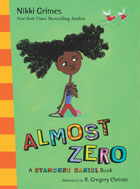 Thirty-plus years ago, at my count, the teenaged daughter of a friend came home one day, demanding that her mother buy her a certain thing—an article of clothing? a music system? a television for her room?—I can’t remember. Whatever the item, the teen insisted she needed it, and pointedly informed her parent that said parent had to supply the item because, well, that’s what mothers are for. To my friend’s credit, her head did not explode, nor did her voice, or her hackles, rise, neither did she scream or shout. Instead, she did a very slow simmer, nodded her head and said something like, “I see. Let me give that some thought.”
Thirty-plus years ago, at my count, the teenaged daughter of a friend came home one day, demanding that her mother buy her a certain thing—an article of clothing? a music system? a television for her room?—I can’t remember. Whatever the item, the teen insisted she needed it, and pointedly informed her parent that said parent had to supply the item because, well, that’s what mothers are for. To my friend’s credit, her head did not explode, nor did her voice, or her hackles, rise, neither did she scream or shout. Instead, she did a very slow simmer, nodded her head and said something like, “I see. Let me give that some thought.”
The next day, while her daughter was at school, my friend removed almost every stitch of clothing her daughter owned from her room, as well as pretty much everything else—posters, radio, music albums, etc, etc, etc. What remained was one school uniform and, I think, underwear and a nightgown. When her daughter ran screaming through the house, my friend explained that, as the parent, she was responsible for providing her child with food, basic clothing, and a roof over her head. Everything else was extra!
Now, that’s what I call poetic justice!
I’m willing to wager her daughter never forgot this lesson, and neither did I. In fact, I remember filing this incident away in my mind, and thinking, “One of these days, I’m going to use this in a story.”
Several years ago, I found myself bemoaning the rise of entitlement in our society, but most especially among our young. Others noticed and frequently commented on the matter as well. That was my signal to tackle the topic, and I began sketching out a draft for Almost Zero: A Dyamonde Daniel Book.
In the original draft, Dyamonde orders her mom to buy her an expensive pair of high-top sneakers. After her mother responds by taking away almost all of Dyamonde’s clothing, Dyamonde schemes to get them back. Some of her schemes were pretty funny, I thought, but my editor felt there needed to be more to the story so I put my thinking cap back on, and wondered what Dyamonde would do if she encountered someone who, for some reason, owned even fewer clothes than Dyamonde had left in her closet. That question led me to a secondary story about a classmate whose family loses everything in a fire, to which Dyamonde responds by organizing a clothing drive.
In the end, I was glad my editor had pushed me to expand my original story. The final version was richer and deeper by far. Almost Zero went on to win great reviews, as well as the Horace Mann Upstanders Award.
I’ll leave you with excerpts from one of my favorite passages in the book. It poses the key question we all should ask when we recognize a need in our community or in our world: What can I do?
“Class,” said Mrs. Cordell, looking up now. “Some of you may have noticed that Isabel isn’t here today. Last night, there was a terrible fire in the apartment house where her family lives, and their apartment was destroyed. Everyone got out safely, thank God, but the family lost everything they owned….”
“Is there gonna be a clothes drive or something?” asked Dyamonde…
“Well, Dyamonde, the school can’t do anything officially…Of course, you’re always free to do something on your own, if you like.”
What can I do? Dyamonde asked herself. I don’t have any money. Then it hit her. But I do have clothes! Somewhere…
“Mom!”


